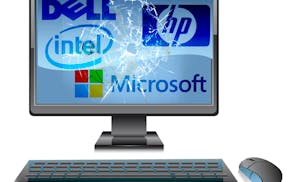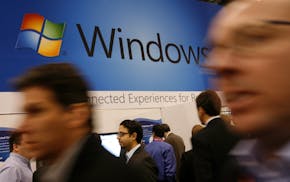Q: More than once in your column I have noticed that you recommend that a person get a PC with Windows 7 installed. I am wondering why you are not suggesting that a PC with Windows 8 or later makes more sense in view of Microsoft's decision not to update Windows 7 after Dec. 31 of this year.
Steve Erwin, Plainview, Minn.
A: The reasons to recommend Windows 7 just keep coming. My original reason was that most people disliked Windows 8 and 8.1, whose design scrambled the basic controls for Windows that users had been accustomed to for many years. My latest reason is that Windows 8 and 8.1 for PCs are on the way out after two years of slow sales. Windows 10 will arrive late next year.
Even though Microsoft's "mainstream support," for Windows 7 will end in January, that isn't a big deal. It only means the end of new or updated features. The more important date for Windows 7 users is the end of "extended support" in January 2020. That's when Microsoft will stop providing security patches for Windows 7, making the operating system a sitting duck for hackers who discover new security flaws in it. (This happened to Windows XP earlier this year.) For the next six years, Windows 7 will be safe.
How did we get to the point where an older version of Windows was better than a newer one?
Windows 8 and 8.1 removed the Start button menu, which was traditionally a guide to programs, and also de-emphasized the main screen, or desktop, so that it was no longer the center of the computing experience. In their place, Windows 8 and 8.1 had colored tiles that were optimized for use with touch screens, even though most PC users didn't have touch screens. I believed Windows 7's interface was better.
In September, Microsoft announced Windows 10 (there will be no Windows 9) will allow consumers to choose either the familiar interface of Windows 7 or the Windows 8 design (see tinyurl.com/m796ay3). I think most PC users will choose the Windows 7 interface, and that the Windows 8 design will be used mostly on touch-screen tablet computers and smartphones.
Why did Microsoft insist Windows 8 was the wave of the future when many customers objected? Many observers believe it was part of a Microsoft strategy to boost slow-selling Windows smartphones. The idea: if consumers became familiar with Windows 8 on PCs, they'd be more likely to buy Windows phones.
But that didn't happen. Windows 8 and 8.1 PC sales lagged. Today there are three times as many Windows 7 PCs in use as Windows 8 and 8.1 PCs combined, according to Net Applications, a data analysis firm. Meanwhile, Microsoft lost market share in smartphones. In the third quarter of this year, Windows phones made up 3.3 percent of worldwide unit sales, down from 4.1 percent a year ago, said research firm Strategy Analytics.
Because of all that, I'll continue to recommend Windows 7 until Windows 10 arrives.
E-mail tech questions to steve.j.alexander@gmail.com or write to Tech Q&A, 425 Portland Av. S., Minneapolis, MN 55488. Include name, city and telephone number.

Alexander: A beeping computer is telling you what's gone wrong inside

Alexander: How to stop deleted iPhone e-mails from coming back

Alexander: Refurbished PCs may need a BIOS update to use new components

Alexander: Windows 11 not always to blame for browser or e-mail problems


